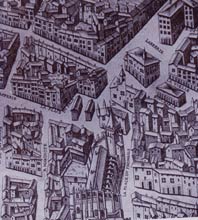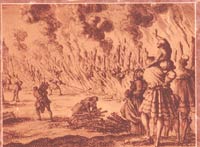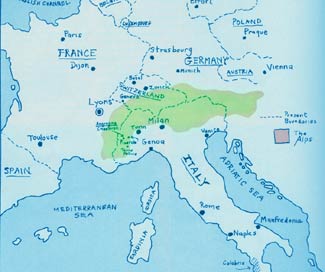
Waldensians
The Origin of the Waldensians
The Waldensians were the most significant kingdom movement of the Middle Ages. This movement began around 1170 in the bustling medieval city of Lyon, France. Here lived a wealthy merchant named Waldesius. He enjoyed his wealth and loved to be able to move within the power circles of his city. He was a good Catholic, attending Mass each week.

But one day after Mass, Waldesius came upon a minstrel singing a ballad about a fourth-century Christian named Alexis. Alexis was the son of a wealthy Roman senator, and he was a rich, spoiled pagan. However, on the day Alexis was supposed to be married, Christ suddenly broke through to him. Touched to his very soul by his conversion, Alexis left everything—his family, his wealth, and his intended bride. With little but the clothes on his back, he journeyed across Europe to Syria. There he spent most of his life praying and fasting, serving others, and sharing the love of Jesus. He endured poverty and great suffering for the cause of Christ.
Years later—his health broken and his body disfigured—Alexis returned to Rome. However, Alexis’ family and friends didn’t recognize him, as he appeared to be just some bedraggled beggar. So Alexis decided to keep his identity a secret. He accepted a menial job from his father (who didn’t recognize him), and he lived in a tiny room under his family’s staircase. He lived that way for seventeen years, trying to serve others in the spirit of Christ. When Alexis died, his family found his diary among his few possessions, and then they realized who he really was.
Waldesius was greatly moved by this story, and it triggered a spiritual crisis within him. Troubled in conscience, Waldesius went to a local priest for counsel. He poured his soul out, and the priest listened intently. After several hours of earnest discussion, the priest got the Bible and read to Waldesius chapter 19 of Matthew about the rich young ruler. “If you want to be perfect, go, sell what you have and give to the poor, and you will have treasure in heaven; and come, follow Me” (Mt. 19:21).
Those words resounded in Waldesius’ ears as he went home. His wealth was no longer a source of happiness to him. In fact, it seemed like a heavy chain around his neck. In a moment of joy and spiritual delight, Waldesius suddenly decided to throw the heavy chain off. He would be a disciple of Christ! He would enjoy the delights of heavenly treasure!
First, Waldesius used some of his wealth to have parts of the New Testament translated into the common vernacular spoken around Lyon. Then, armed with the Scriptures, he gave all of his remaining possessions to the needy.
“Citizens and friends,” Waldesius told the people of Lyon as he gave away his goods. “I am not out of my mind, as you may think. I am freeing myself from the things that were oppressing me. For they made me a lover of money more than a lover of God. This act I am doing both for myself and for you: For myself—so that if ever again I possess anything, you may indeed call me a fool. For you—in order that you, too, may be led to put your hope in God and not in riches.”1
Waldesius went about the city of Lyon, preaching the simple gospel of the kingdom to everyone. His earnestness and example of faith touched many lives. Soon a small group of like-minded believers gathered with him. They called themselves the “Poor in Spirit.” They wanted to take every aspect of Jesus’ teaching literally and seriously. They decided to taste the joy of true, uncompromising discipleship for themselves. The kingdom of God had reached Lyon—and it was turning the city upside down!

Waldesius and his disciples had no desire or vision to form a new church. In fact, they had no desire to even challenge or attack the Catholic Church. They simply wanted to live out authentic Christianity within the folds of the Catholic Church and to share their joy with others. They taught no new doctrines, but simply preached the same message that Jesus had preached. Although some wealthy persons and some intellectuals joined the “Poor in Spirit,” their membership came predominantly from the poor.
The Poor in Spirit easily could have become a spiritual society within the Catholic Church—if it hadn’t been for a couple of their convictions. First of all, they didn’t seek the permission of the Church for what they were doing. Secondly, they had no intention of hibernating in monastic seclusion. They wished to remain citizens of Lyon, taking their message to the churches, public squares, and market places.
One of Waldesius’ early disciples wrote, “The decision we have taken is this: to maintain until our death, faith in God and in the Church’s sacraments. ...We have decided to preach freely, according to the grace given to us by God. This we will not cease to do for any cause.”2 Belittling the doctrines of the Church or challenging its authority were the furthest things from the minds of the Poor in Spirit. In fact, they were encouraging their hearers to attend church more faithfully. How could the Church possibly object to what they were doing?
However, before long, Waldesius and the Poor in Spirit were awakened from their spiritual naivete. The Catholic Church had no objections to the lifestyle of the Poor in Spirit. The Church viewed them as simply following the way of the “perfect.” It was a good thing, but not necessary. And the Church had no objections to their doctrines, because they essentially had none.
However, the archbishop was not comfortable with the fact that the Poor in Spirit—untrained at any university and not ordained by the Church—were out preaching on the streets. Ever since the time of Constantine, the Church had tried to maintain a monopoly on preaching. As we discussed earlier, one of the characteristics of the Hybrid was its belief that only those licensed by the institutional Church could safely preach the Gospel. So the archbishop ordered Waldesius to appear before him. He then demanded that Waldesius and the Poor in Spirit quit preaching. Sternly reprimanding Waldesius, the archbishop told him that preaching belonged only to the clergy.
The spiritual lives of thousands now hung in the balance. Waldesius could have played the part of a good Catholic and said, “Yes, your holiness, whatever you direct.” He and the Poor in Spirit could have continued to live the kingdom lifestyle under the authority of the Church, and they undoubtedly would have continued to attract new disciples. But Waldesius would not agree to quit preaching. Instead, to the utter shock of the archbishop, Waldesius looked him squarely in the eye and fearlessly replied, “On the contrary, preaching belongs to everyone who chooses to truly live like the apostles of Jesus.”

Persecution eventually drove the Waldensians to settle in the Alps along the French-Italian border and across northern Italy, southern Switzerland, and western Austria. © Scroll Publishing Co.

For more information about the Waldensians, we recommend:
CD: Waldensians
$1.00
